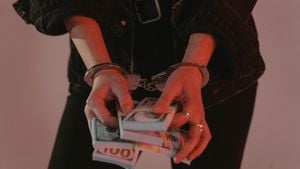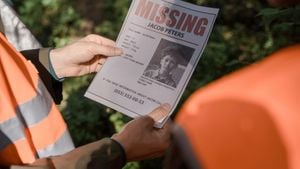A discussion about the ever-looming threat of nuclear war is gaining significant traction, as recent literary works highlight the chilling realities of such conflicts. Amid the anxieties stemming from geopolitical tensions, various authors have explored the theme of nuclear war and its ramifications through their writing. The latest contender to make waves is Annie Jacobsen's book, "Nuclear War: A Scenario," which dives deep, attempting to portray the terrifying potentialities of nuclear conflict.
On October 10, 2023, Jacobsen's book was included among the finalists for the prestigious Baillie Gifford Prize, which aims to celebrate the most compelling nonfiction. The award, often viewed as the country's leading nonfiction book prize, recognizes authors who illuminate the real-world issues they tackle through their works. This year’s shortlist boasts serious contenders, including books from acclaimed writers like Richard Flanagan, Viet Thanh Nguyen, and Sue Prideaux.
Jacobsen, known for her thorough research, delivers what some on the prize's judging panel deem her latest work as "deeply researched and terrifying." The narrative outlines, minute-by-minute, the events following the hypothetical launch of nuclear weapons by rogue states against the United States. Given today's precarious situation involving several global powerhouses, her depictions strike chords with many readers.
The Baillie Gifford Prize is not merely limited to Jacobsen’s perspective; it also features Flanagan's "Question 7," which offers insights from his life, particularly moments shaped by his literary prowess. Flanagan's acclaim reached new heights when he won the Booker Prize for his novel "The Narrow Road to the Deep North" back in 2014. Another contender, Nguyen, pens “A Man of Two Faces: A Memoir, A History, A Memorial,” which intertwines personal history with broader reflections on identity.
Among the exceptions on the shortlist, perhaps more aligned with the conventional expectations of history and biography, are Rachel Clarke’s "The Story of a Heart" and David Van Reybrouck’s "Revolusi: Indonesia and the Birth of the Modern World," representing eclectic themes present within the award ceremony.
Founded back in 1999, the Baillie Gifford Prize aims to commend the most insightful English-language works spanning diverse genres, be it politics, science, history, art, or any tandem of relevant societal reflections. Its reputation, bolstered by previous winners like John Vaillant, who penned the climate-change narrative "Fire Weather: A True Story from a Hotter World," makes this year’s shortlist compellingly diverse.
The effort to bring public consciousness to nuclear issues has gained boosted urgency amid current global threats. Mark Trevelyan, writing for Reuters, elaborates on the alarming sentiments conveyed by the latest developments involving nuclear arsenals and global tensions. For example, Russia's recent adjustments to its stance on nuclear weapon deployment have escalated fears significantly, with experts noting the increased likelihood of nuclear risks.
Indeed, the decision to award this year’s Nobel Peace Prize to the grassroots organization Nihon Hidankyo, which comprises survivors from the atom bombs dropped on Hiroshima and Nagasaki, reinforces the theme of nuclear awareness being infused within contemporary literature. This accolade serves as both recognition and reminder and has prompted widespread discussions about the nature of nuclear deterrence and global safety.
The Egyptian-born Iranian political commentator, Foad Izadi, states, "The impulsive nature of geopolitical decision-making can hastily throw nations to the brink of nuclear conflict. Literature brings forth the questions we dare not ask but desperately need to address.”
The backdrop of this angst-filled narrative is particularly poignant. Not long ago, world leaders reaffirmed the notion around mutual nuclear destruction during times of specific intrigue and combativeness, which nevertheless ensures these potent symbols of power remain influential yet feared.
Jacobsen’s contribution shines within this scope, engaging with themes of deterrence and the potentiality of war over misunderstandings or miscalculations. With every readership challenged to wrestle with these realities, literature provides both reflection and caution. According to the Wall Street Journal, her work raises “an important reminder of responsibilities carried by those wielding such destructive platforms.”
The ramifications of nuclear engagement are especially grievous as John Ainslie, representative of the Scottish Campaign for Nuclear Disarmament, states, “The underlying message of literature tackling this subject becomes its power—invoking fear, inspiring action, and prompting dialogue about nuclear disarmament.”
Today’s narratives reach far beyond the mere pages of novels or nonfiction books; they invite readers to think critically, pondering scenarios previously relegated to the margins of science fiction. Yet, what remains equally hard to ignore is the grim reality garnered from this literary achievement, allowing people to view the topic through varied lenses. Winners here, regardless of who eventually stands crowned on Nov. 19, capture and showcase the urgency woven through the collective concerns of our time.
With anxieties around geopolitical relations increasingly prevalent, works like "Nuclear War: A Scenario" and others exemplify how literature and personal narratives can mirror the uncertainty faced globally. For half of this century, I hope we can count on literature to transcend fears rather than exacerbate them, prompting dialogue and potential peace instead of conflict.



